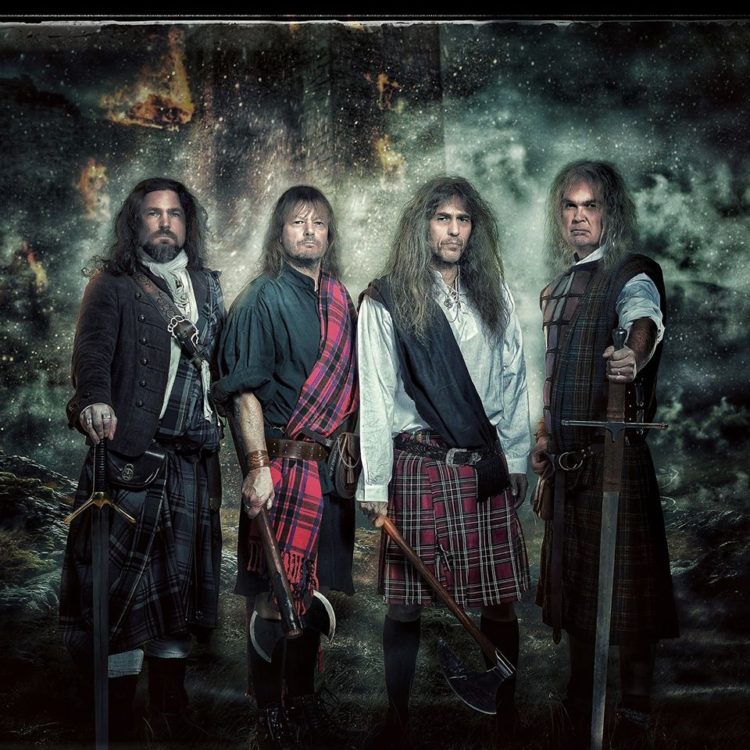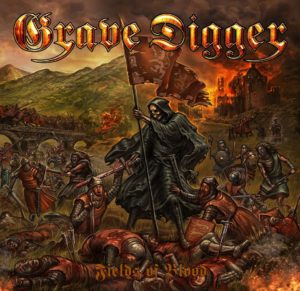
Teutonic metal icons Grave Digger love to make music that is epic in scope, cinematic in tone, powerful in musicianship, and compelling in its lyrical storytelling. It’s an approach that’s worked for 19 previous studio albums, countless tours and four decades of connecting with audiences around the world.
And it’s an approach that has resulted in the bombastic, revelatory and celebratory new album of compositional masterpieces, Fields of Blood, released on May 29 on Napalm Records. It is the third part of a trilogy focusing on the history and colourful iconic personages of Scotland and is a delightful historical flight of fancy that brings real people, real battles and real themes to light for a modern audience, and in a uniquely creative way.
The fervent fascination with Scotland may seem odd coming from someone not born and raised in the British Isles, nor coming from a country that has a substantial Scottish heritage, such as Canada or New Zealand. Yet, the stories, landscape and culture of England’s northern neighbour lit a creative spark within the heart and mind of band founder, vocalist/songwriter Chris Boltendahl that has not subsided for a quarter century.
The album actually goes in chronological order, with the stories of each song getting closer and closer to modern times as each song plays. All For the Kingdom, the lead-off track (coming just after an incredibly stirring bagpipe intro called The Clansman’s Journey) looks at early Scottish King Malcolm II as he battled the Danish invader Cnut in the early 11th century. Lions of the Sea also looks at the way Scotland’s coastal people had to contend with Viking Raiders, while Freedom is an ode to arguably the greatest, and certainly most universally well known Scottish hero, William Wallace. The Heart of Scotland is about another national hero, Robert the Bruce, who picked up Wallace’s mantle and led Scotland to independence from England at the Battle of Bannockburn in 131f. Thousand Tears looks at the life and death of Mary Queen of Scots, who was executed on the orders of Queen Elizabeth I, while Union of Crown is about James I, Elizabeth’s heir, who was first King James VI Scotland, and then King James of England, uniting the crowns.
The last three songs, Gathering of the Clans, Barbarian and Fields of Blood chronicle the continued battle for Scottish independence, including the demoralizing and brutal Battle of Culloden in 1745, depicted most compellingly in the moving and powerful song Barbarian.
“These heroes are the more fascinating characters in Scottish history, which is marked by centuries of freedom fighters and believing in their own country, people who continued to fight for the independence of the Scottish people. I love to create stories about that, and at the end of the day, bring it to the people to show them my images, my snapshots of what I have in my mind when I wrote these lyrics,” Boltendahl said, adding that he loves stories of underdogs, because he believes metal music, and metal fans, are underdogs, and have been since the genre was created.
 “When I was young, I got an education for a technical job and I was 16 at the time and had really gotten into metal music and then started playing in a band and had grown my hair long. I got pressure from the masters and instructors from my education, they were saying I can’t wear long hair, I look like a girl, and called me a stupid boy. But I believed in myself, and I listened to metal and that keep me alive. Metal was always a bit of an underground music. Nowadays in some ways its more popular, especially when you see Metallica or Iron Maiden playing big stadiums, but in our hearts, metal is still music for the underdog.
“When I was young, I got an education for a technical job and I was 16 at the time and had really gotten into metal music and then started playing in a band and had grown my hair long. I got pressure from the masters and instructors from my education, they were saying I can’t wear long hair, I look like a girl, and called me a stupid boy. But I believed in myself, and I listened to metal and that keep me alive. Metal was always a bit of an underground music. Nowadays in some ways its more popular, especially when you see Metallica or Iron Maiden playing big stadiums, but in our hearts, metal is still music for the underdog.
“Like these Scottish heroes and rebels, they had that attitude of fighting back. When I was younger, I was fighting against my parents, fighting against the expectations of mainstream society and everything, and it’s a feeling I have kept until this day. Metal is now different, but in our heart’s it’s the same attitude. I don’t care if you’re 18, or 30 or 58 years old like I am, metal keeps us alive and young. And with this attitude we can survive anything.”
The notion of a Trilogy of stories about the Scottish Highlands, it’s legends, history, tragedies and heroism was not something Boltendahl thought of in advance when putting material together for the 1996 album Tunes of Way, the first album that dealt with the subject matter, nor was it in his mind’s eye when the putative part two, The Clans Will Rise Again, came out in 2010. It took a vacation trip to the vast beautiful vistas of the highlands with his song to bring forth the idea of a third part of the story.
“At first when we thought about Tunes of War, we never thought about a big concept that would be about Scotland. At first, we talked to the bass player at the time, Tomi Gottlich, who was also a history and English teacher, and asked what he thought about doing two songs about Scottish History and he said why not. But then when we saw how good they came out, using this idea, we decided to do a complete record. At this time, Tomi was more responsible with me for the lyrics and because he is a teacher, Tunes of War sounds more like a history lesson from the beginning to the end,” Boltendahl said.
“The Clans Will Rise Again was a totally different thing. [Guitarist] Axel Ritt came into the band 11 years ago and he said, ‘hey, I am a big fan of Tunes of War, let’s do a second part.’ And we said, ‘okay, good idea, let’s do it again.’ But we didn’t want to do it the same way that we did on Tunes of War, so we picked up more stories of Scotland, not from a historical perspective, but more of the fantasy and mythology, more of the mystical side of Scotland.
“Scotland is a fantastic country and every 10 miles or so you can visit this amazing castle, one more beautiful than the next. And then when you drive through the highlands you can feel how mystical it is. You can breathe the air of warriors fighting for their freedom. That is something really special, and something we never really had in Germany. At the end of the day, I am really deep into the medieval history of Great Britain, and I love to sing about Richard the Lionheart like it did on Knights of the Cross [1998] and Excalibur [1999]. I was with my family in Scotland two years ago and I took my boy to see some of the sites. When I got back, I said to Axel, ‘okay, we have to do a trilogy.’ With this third part, I created a character of this clansman working in a museum kind of daydreaming and going back through his family history to all these important battles and seeing all these important heroes of Scottish history. And once I decided that, all the lyrics came out pretty quickly, as well as the musical ideas. We wrote the complete record in about four months.”
Fields of Blood is Grave Digger’s 20th studio album and is coming out the same year as the 40th anniversary of the band’s foundation with Boltendahl being the last original member still in the lineup.
“We had planned a number of things to happen this year, not just the release of the new album. We had a great number of 40th anniversary shows, and were also supposed to play Wacken, which is a big show. But everything is moved to next year because of the Covid-19 issue. So, next year we will celebrate 40 years plus one. Honestly, whether it’s this year or next year, we are still going to celebrate this special anniversary,” said Boltendahl.
 “When I started the band at 18 years old it was all about heavy drinking and smoking weed and living the original rock star life. And I thought I would be dead by the time I was 30 years old. But then when I got to 30 years old, I said, ‘well, perhaps I can reach 40.’ And then when I was 40, I stopped drinking, stopped smoking, I had a son and now I am 58 years old, staying alive, loving music, and playing golf.
“When I started the band at 18 years old it was all about heavy drinking and smoking weed and living the original rock star life. And I thought I would be dead by the time I was 30 years old. But then when I got to 30 years old, I said, ‘well, perhaps I can reach 40.’ And then when I was 40, I stopped drinking, stopped smoking, I had a son and now I am 58 years old, staying alive, loving music, and playing golf.
“Over these 40 years I have had my bad and my good experiences, and I still love to be on the scene. I love to be a heavy metal musician; it is the greatest gift I have got from, I don’t know, from a force above. I love my life; I love my fans and what else can I hope for? As for why it’s lasted so long, I think it’s believing in myself and what I can do. At first, I have to say, I love heavy metal, and I have loved heavy metal since I was 12 years old and grew up listening to Black Sabbath. I was watching YouTube videos today from a show in Germany from 1983 and it had Quiot Riot, Judas Priest, Ozzy Osbourne, with the Scorpions and Iron Maiden – all of these bands over two days in one place. And I was there, I was at that festival in 1983, and it was a great time.
“So, I started as a fan, and after all these years I am still a heavy metal fan too. And I love to play this kind of music. I had the good luck to find my voice and my identity that the people seem to love in my music. I find there is still a lot of creativity these days in my head and so Grave Digger will carry on. I think we have the ability to carry on for a few more years as well. I still get excited about my music. I love this new album, I listen to it two or three times a day, I love it that much. I love my own work, and I think you have to as an artist. I think that if I love it, I think other people, or fans will love it as well. That’s the energy that keeps me going.”
Besides Ritt and Boltendahl, Grave Digger also features bassist Jens Becker, who has been in the band since 1998, and drummer Marcus Kniep, who is two years into his stint behind the kit and who has played keyboards for the band on record since 2014.
Although touring plans are on hold for Grave Digger, and every other band/musician on the planet, Boltendahl is optimistic that they will be able to hit the road next year, and also hopes to return to Canada and the U.S., where they had not played for more than four years. In the interim, the band is cranking up its creative engines, with new music already in the works.
“We start in one month writing new music. The concept is already fixed as to what we’re going to do for the next album. And the cover art is also in progress already, so we will see how it turns out,” he said.
For more information on Grave Digger, Fields of Blood and possible 40th [41st] anniversary tour dates, visit www.facebook.com/gravediggerofficial, www.instagram.com/gravediggerband, www.twitter.com/GRAVEDIGGERclan or www.grave-digger-clan.de.
- Jim Barber is a veteran award-winning journalist and author based in Napanee, ON, who has been writing about music and musicians for 30 years. Besides his journalistic endeavours, he now works as a communications and marketing specialist. Contact him at jimbarberwritingservices@gmail.com.
